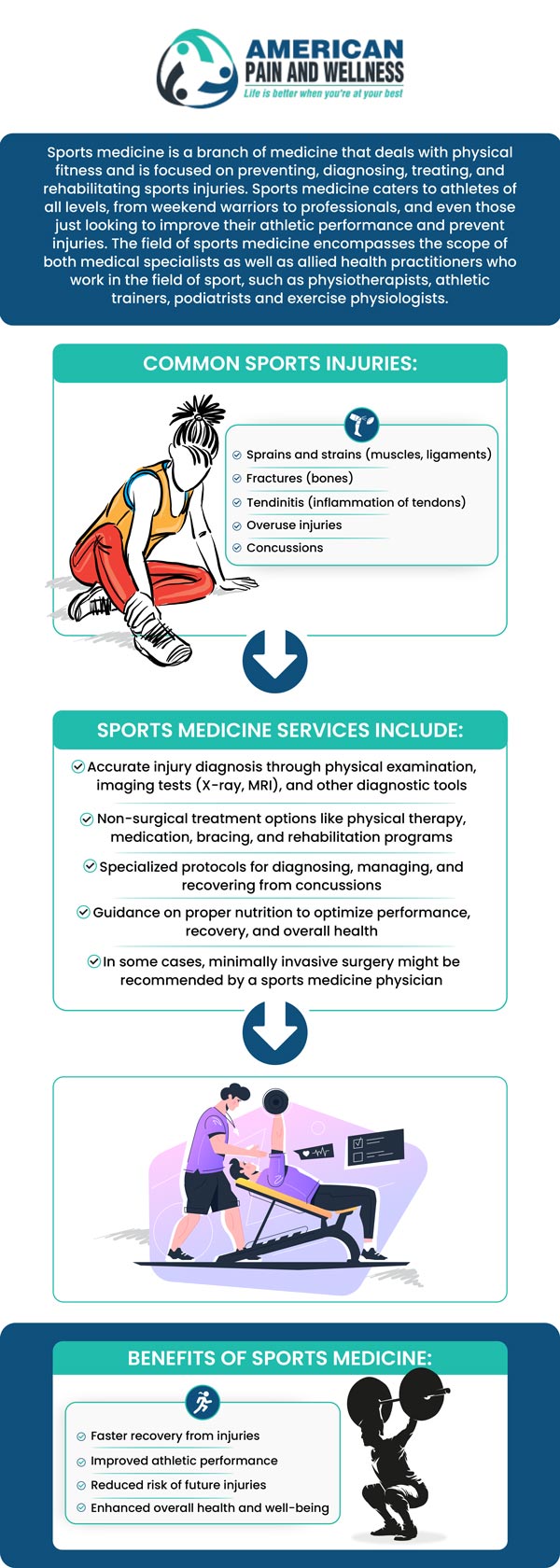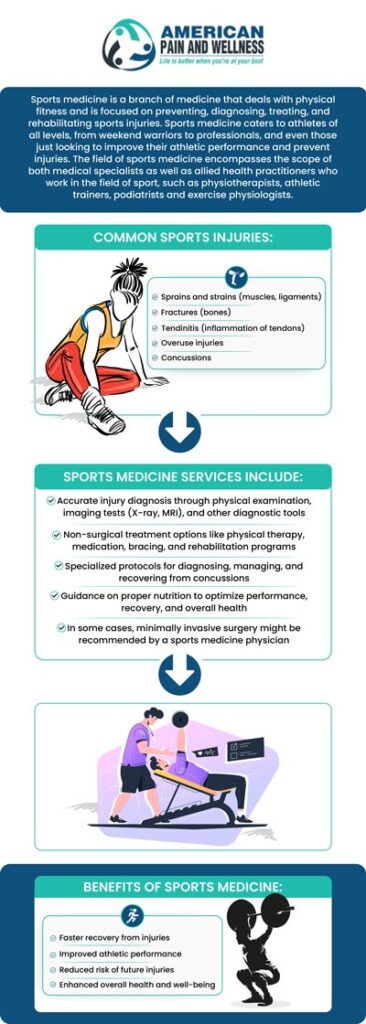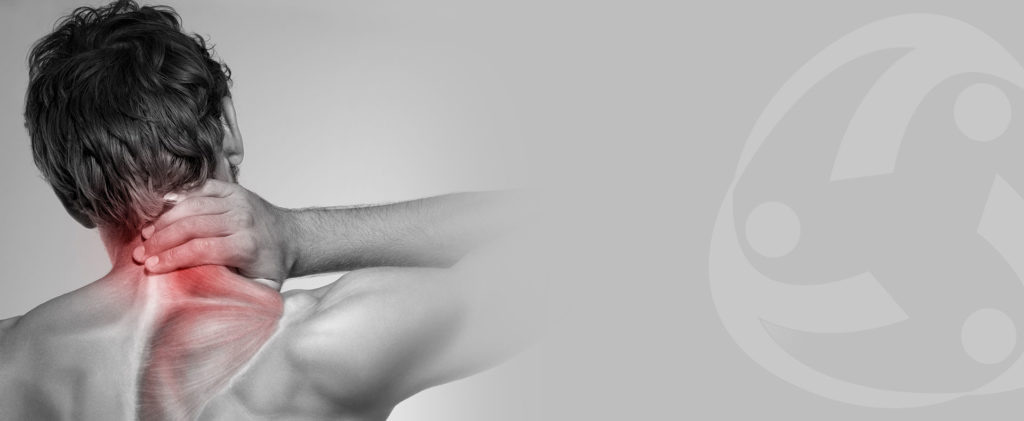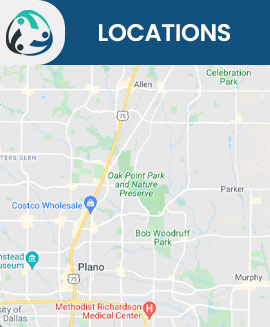Sports Medicine Doctor Q&A
Do you have a sports-related injury and need a sports medicine specialist in Allen, TX, or Plano, TX? Please come to American Pain and Wellness! We know life is better when you are at your best, and Dr. Steven L. Remer, M.D., and his team offer pain management services. We have convenient locations to serve you in Texas. For more information, please ccontact us or request an appointment online.




Table of Contents:
What do sports medicine specialists do?
What is the difference between a sports medicine doctor and orthopedic doctor?
How do you heal sports injuries faster?
What is the best treatment for serious sports injuries?
What is the first aid for sports injury?
What are the causes of sports injuries?
So many people play sports these days – from football to tennis, and from basketball to baseball. Sports are competitive, fun, and they give us that rush of energy when we chalk-up points on the scoreboard. A touchdown, a homerun, and a three-pointer from center court – all magical. However, while enjoyable, sports do come with a cost: injuries. Most athletes – amateur and professionals – have experienced injuries, and they are always seeking ways to prevent them from happening. Do you have a sports injury, or a non-sports injury? If so, contact Dr. Steven L. Remer and his team at American Pain & Wellness. We are here to help treat your pain and get you back in the game. Call us today to book an appointment.
Sports medicine, also referred to as sports and exercise medicine, focuses on preventing and treating injuries that are related to sports and physical exercise. Sports medicine specialists are the ones who specialize in diagnostics, prevention and treatment of injuries associated with sports and other forms of exercise. Sports medicine specialists work with athletes, and they also work with other patients who have other injuries.
Sports medicine doctors are more focused on the complete health care of athletes, while orthopedic doctors specialize in the operative treatment of injuries. Nearly 90% of sports injuries are non-surgical, and both sports medicine doctors and orthopedic doctors are trained in the care of musculoskeletal problems. Sports medicine doctors are also trained in non-musculoskeletal area of sports, which include concussions, overtraining and fatigue, nutrition, training and conditioning, exercise induced asthma, and return-to-play issued after an injury or sickness.
Every athlete is eager to get moving again after an injury – whether it is returning to their daily activities or sport of choice. So, how do you get back into the game or your life-routine faster? It all depends on the overall health of a person and what kind of injury they have. Is it a knee injury or golf elbow? Or is it a groin pull or shin splint? There are a number of simple methods to treat injuries. Doctors may recommend the following: get rest and avoid putting weight on the injured area for 24-48 hours; applying and ice pack on the injured area frequently during the first 24-48 hours in order to reduce pain and swelling; wrap the injured area with an elastic medical bandage to prevent swelling; and elevate the injured part of the body above the heart to reduce throbbing, swelling, and pain.
What everyone should know is right after an injury, control the inflammation so that the healing process will start immediately. There are also a number of foods and supplements that can help the body heal faster. Protein-rich foods, like fish and meat, help enhance the body’s muscle-building process; Vitamin C can help produce collagen and help rebuild tissues with its anti-inflammatory properties; omega-3 fats are ideal to help reduce excessive inflammation; and calcium-rich foods and Vitamin D help from sunlight exposure, which is important for a fracture to heal more quickly.
A fast recovery from a sports injury requires managing the early healing process of the injured area and having a well-mapped out rehabilitation strategy. There are minor sports injuries, also known as chronic injuries, and then there are acute injuries, which are the result of a sudden traumatic event, like ankle sprains, wrist fractures, hamstring muscle sprains, shoulder dislocations, and concussions. While many injuries can be treated at home, fractures and dislocations, for example, warrant urgent medical attention. In the event of a concussion, or deformity, or worsening signs on an injury, a trip to the emergency clinic is a must. You will be assessed by a doctor who may recommend prescribed medications, diet, and a strategic physical rehabilitation plan to get you moving again.
We all know accidents happen, especially while playing sports. While there are preventative strategies, one collision or one wrong step on the field can result in a painful injury. It is important that you know how to act quickly, or when to seek medical help in your area. Whether it be a chronic injury or acute injury, the first thing to do is stop all activity right away to prevent further damage or injury. In the event of an acute injury, immobilize and call 911. Immediately following most injuries, it is recommended that you get rest, reduce pain and swelling with an ice pack, quickly compress an injured limb to minimize pain and to stabilize the injured area, and elevate the injured area above the heart to reduce pain and swelling (depending on the injury, you might want to consider elevating the injured area above the head or as high as possible).
The main causes of sports injuries include poor training methods; weakness in muscles, ligaments and tendons; unsafe exercise environments; and structural abnormalities. It is also important to know the top injury prevention tips: when jumping, land with your knees bent; perform warm-up exercises before practice or game-time; wear shoes that fit, absorb shock and are stable; run on flat surfaces, and make sure you cool down after a hard workout or a challenging game.
American Pain & Wellness is here to help treat your pain and get you back scoring points or breaking new records on the ice, field, court, track, or in the ring. Call us today to book an appointment.
Check Out Our 5 Star Reviews


Additional Services You May Need

Additional Services You May Need
• BACK AND NECK PAIN
• FACET INJECTIONS
• JOINT INJECTIONS
• PAIN MANAGEMENT
• REGENERATIVE MEDICINE
• PRP INJECTIONS
• HERNIATED DISC
• SPINE PAIN MANAGEMENT
• ARTHRITIS
• MUSCLE PAIN
• RHEUMATOLOGIC PAIN MANAGEMENT
• SACROILIAC JOINT PAIN
• NERVE PAIN
• ABDOMINAL AND PELVIC PAIN
• SPINAL STENOSIS
• SCIATICA TREATMENT
• PHYSICAL REHABILITATION THERAPY
• COMPLEX REGIONAL PAIN SYNDROME
• OSTEOARTHRITIS
• IMMEDIATE RELIEF FOR SCIATICA PAIN
• EPIDURAL STEROID INJECTIONS
• DYSTONIA
• CHRONIC PAIN
• CANCER PAIN
• AUTO ACCIDENT INJURY
• ARACHNOIDITIS




